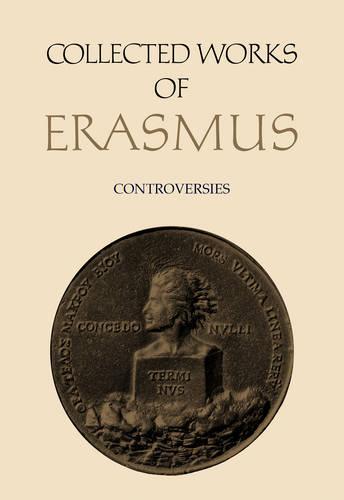Overview
Among the most important of Erasmus’ contributions to Christian humanism were his Greek text, new Latin translation, and annotations of the New Testament, an implicit challenge to the authority of the Vulgate and one that provoked numerous responses. This volume of the Collected Works contains translations of four of Erasmus’ responses to his critics, written between 1520 and 1532 and directed primarily to his Franciscan and Dominican contemporaries at the university in Louvain. Three are connected to his Annotations on the New Testament. The fourth, a letter to Christopher von Utenheim, bishop of Basel, deals with pastoral questions such as fasting, abstinence, and the celibacy of priests. Though they mostly deal with philological rather than doctrinal matters, these debates were no less important to Erasmus’ work. Carefully and extensively annotated by the translator, Denis L. Drysdall, volume 73 of the Collected Works invites the reader to examine Erasmus’ own explanations of his philological method and its theological significance. Volume 73 of the Collected Works of Erasmus series.
Full Product Details
Author: Desiderius Erasmus , Denis L. Drysdall
Publisher: University of Toronto Press
Imprint: University of Toronto Press
Volume: 73
Dimensions:
Width: 18.00cm
, Height: 2.80cm
, Length: 25.50cm
Weight: 0.800kg
ISBN: 9781442648944
ISBN 10: 1442648945
Pages: 344
Publication Date: 11 August 2015
Audience:
College/higher education
,
Professional and scholarly
,
Tertiary & Higher Education
,
Professional & Vocational
Format: Hardback
Publisher's Status: Active
Availability: Out of stock 
The supplier is temporarily out of stock of this item. It will be ordered for you on backorder and shipped when it becomes available.
Table of Contents
Introduction Translator’s Note A Defence by Erasmus of Rotterdam Publicly Refuting the Mischievous Clamour of Certain Men among People both Influential and Humble to Whom They Declare that it was an Impiety on his Part to Translate in the Gospel of John: In principio erat sermo (1520a) Apologia Erasmi Roterodami palam refellens quorundam seditiosos clamores apud populum ac magnates, quibus ut impie factum iactitant, quod in evangelio Ioannis verterit, ‘In principio erat sermo’ A Defence by Desiderius Erasmus of Rotterdam of In principio erat sermo (1520b) Desiderii Erasmi Roterodami Apologia de ‘In principio erat sermo’ A Defence by Erasmus of Rotterdam against Criticism Made in Public Teaching by Nicolaas of Egmond of the Passage in Paul’s First Epistle to the Corinthians, Chapter 15 ‘We shall indeed all rise again, but we shall not all be changed’ Desiderii Erasmi Roterodami Apologia de loco taxato in publica professione per Nicolaum Ecmondanum Theologum et Carmelitanum Lovanii. Locus est in epistola Pauli ad Corinthios priore, cap XV: ‘Omnes quidem resurgemus, sed non omnes immutabimur A Letter by Desiderius Erasmus Defending his Views Concerning the Prohibition on Eating Meat and Similar Human Regulations, to the Reverend Father in Christ and Honourable Prince Christopher, Bishop of Basel Ad reverendum in Christo patrem et illustrem principem Christophorum episcopum Basiliensem, epistola apologetica Erasmi Roterodami, de interdicto esu carnium, deque similibus hominum constitutionibus Notes on the Letter about Abstinence In epistolam de delectu ciborum scholia A Response by Desiderius Erasmus to the Discussions of a Certain ‘Youth Who Would Teach his Elders’ Desiderii Erasmi responsio ad Collationes cuiusdam iuvenis gerontodidasca Works Frequently Cited Short-Title Forms Erasmus’ Works Index of Scriptural References Index of Green and Latin Works Cited General Index
Reviews
'The Toronto Erasmus project is a magnificent achievement, one of the scholarly triumphs of our time. The succession of fine volumes - both in quality of content and of design and production - has continued to fulfil the original promise of the distinguished team of editors and the equally distinguished advisory committee.' -- Lisa Jardine Common Knowledge 'Academic publishing does not get any better than this: durably bound, expertly annotated, beautifully translated editions of the works of one of the finest scholars in the illustrious history of the Christian Church.' -- Michael Bauman Journal of the Evangelical Theological Society 'The Collected Works of Erasmus project has long since established a new standard for scholarly translation series to emulate. Not only have the English versions represented Erasmus' writings in crisp and accessible language, but meticulous editorial scholarship has placed the author's thought and work in their proper intellectual contexts.' -- Jerry H. Bentley Renaissance Quarterly 'One of the most ambitious, meticulous, and essential scholarly projects now underway.' -- Willis G. Regier Modern Language Notes
Author Information
Desiderius Erasmus (c. 1466–1536), a Dutch humanist, Catholic priest, and scholar, was one of the most influential Renaissance figures. A professor of divinity and Greek, Erasmus wrote, taught, and travelled, meeting with Europe’s foremost scholars. A prolific author, Erasmus wrote on both ecclesiastic and general human interest subjects. Denis L. Drysdall retired as chairperson and associate professor of Romance Languages from the University of Waikato, Hamilton, New Zealand, where he remains a research associate.
Tab Content 6
Author Website:
Customer Reviews
Recent Reviews
No review item found!
Add your own review!
Countries Available
All regions
|




